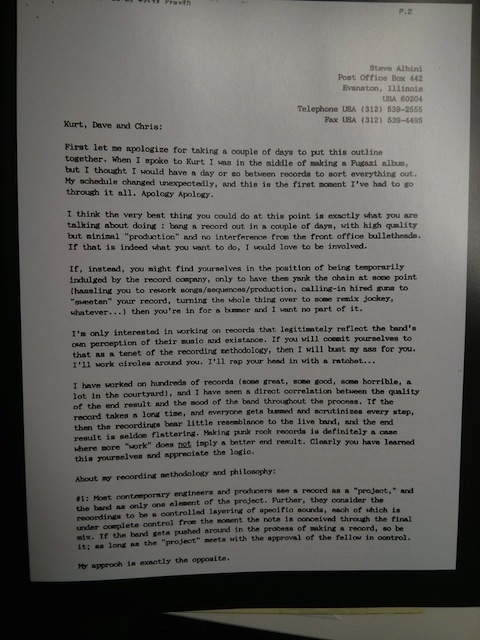Click for larger image
Journeyman record producer Steve Albini (he prefers to be called a “recording engineer”) is perhaps the crankiest man in rock. This is not an effect of age. He’s always been that way, since the emergence of his scary, no-frills post-punk band Big Black and later projects Rapeman and Shellac. In his current role as elder statesman of indie rock and more, Chicago’s Albini has developed a reputation as kind of a hardass. He’s also a consummate professional who musicians want to know and work with. From the sound of the Pixies’ Surfer Rosa to Joanna Newsome’s Ys, Albini has had a hand in some of the defining albums of the last thirty plus years, and there is good reason for that: nothing sounds like an Albini record. His method is all his own, and his results—minimalist, dynamic, and raw—are impossible to argue with.
So when Nirvana embarked on recording their final, painful (in hindsight) album In Utero, they asked Albini to steer them away from the more major-label sound of the breakout Nevermind, produced by Butch Vig. True to form, the typically verbose Albini sent a four-page typed letter in response. The letter (first page above—see the rest here) is a testament to perhaps the most thoughtful producer since Quincy Jones and lays out Albini’s philosophy in very fine detail. A sample paragraph serves as a thesis:
I’m only interested in working on records that legitimately reflect the band’s own perception of their music and existence. If you will commit yourselves to that as a tenet of the recording methodology, then I will bust my ass for you, I’ll work circles around you. I’ll rap your head in with a ratchet….
Albini decries any interference from the “front office bulletheads,” or record company execs (his feuds with such people are legendary), and makes it quite clear that he’s there to serve the interests of the band and their sound, not the product of a marketing campaign. While Albini has issued many a surly manifesto over the years, this statement of his craft is maybe the most comprehensive. He is driven by what he calls a “kinship” with the bands he works with, and his passionate commitment to musicians and to quality sound makes him one of the most artistically virtuous people working in popular music today. For more on Albini, see the excellent interview below. For more on In Utero, now twenty years old, read Dave Grohl’s Rolling Stone interview here. The letter is included in this year’s remixed and remastered 20th anniversary of the album.
via Vanyaland
Related Content:
Nirvana Plays in a Radio Shack, the Day After Recording its First Demo Tape (1988)
Nirvana’s Home Videos: An Intimate Look at the Band’s Life Away From the Spotlight (1988)
The First Live Performance of Nirvana’s “Smells Like Teen Spirit” (1991)
Josh Jones is a writer and musician based in Durham, NC. Follow him at @jdmagness



Can we try and get over Nirvana already?
Albini goes into detail about the letter and recording In Utero in this interview:nnhttp://vishkhanna.com/2013/08/16/ep-24-steve-albini/
That’s awesome. I found a hilarious and awkward interview of Steve Albini. Check it out: http://www.youtube.com/watch?v=YUl3tdVIl9A